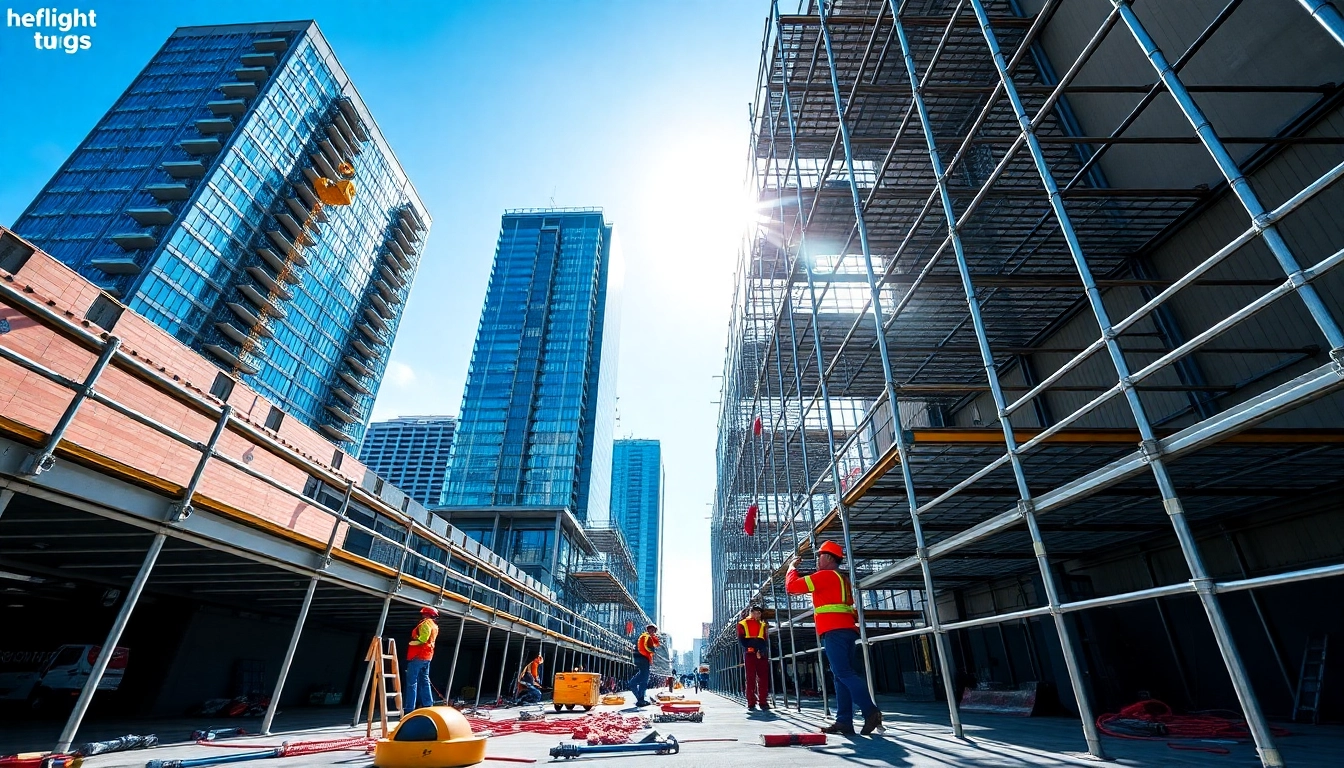Top Scaffolders Manchester: Building Excellence in Construction Services

Understanding Scaffolders Manchester
The Role of Scaffolders in Construction
Scaffolders play a vital role in the construction industry, acting as the backbone for many building projects. They provide temporary structures that allow workers to reach heights safely and efficiently. The fundamental purpose of scaffolding is to ensure that construction or maintenance work is performed safely. Scaffolders must possess a deep understanding of structural integrity, load-bearing capacities, and safety protocols to execute their tasks competently.
In Manchester, scaffolders are pivotal for various types of projects, from residential renovations to large commercial constructions. They serve several functions, including erecting, maintaining, and dismantling scaffolding frameworks. Scaffolders are trained to work with various materials, enhance accessibility, and ensure compliance with health and safety regulations. This expertise is particularly significant in urban settings like Manchester, where buildings often vary in height, design, and construction techniques.
Benefits of Hiring Local Scaffolders
When considering a construction project in Manchester, one of the first steps is deciding on the scaffolding services needed. Hiring local scaffolders comes with a plethora of benefits. Local scaffolders are familiar with the specific regulations and requirements that apply to construction sites in the Manchester area. This local knowledge can streamline the planning process and mitigate potential setbacks.
Another advantage of engaging local scaffolders is the potential for faster service delivery. Being geographically closer means that local scaffolders can respond more quickly to project needs, which is crucial in keeping many construction schedules on track. Moreover, working with local professionals often allows for better communication, making it easier to relay any project-specific requirements or modifications.
Moreover, engaging Scaffolders Manchester provides opportunities to directly assess their past projects, enabling potential clients to review the quality of work and suitability for their specific tasks.
Common Types of Scaffolding Services in Manchester
There are several types of scaffolding services commonly offered by scaffolders in Manchester to cater to diverse construction needs:
- Temporary Scaffolding: Essential for both residential and commercial projects, this type of scaffolding provides a safe working platform for construction workers.
- Supported Scaffolding: This is among the most basic forms, where the structure is supported by poles and frames. It’s ideal for medium and large projects involving significant height and increased worker mobility.
- Suspended Scaffolding: Perfect for high-rise buildings or jobs where workers need to move vertically and laterally along the structure, such as window replacement or building maintenance.
- Mobile Scaffolding: This type features wheels or casters, allowing it to be easily moved as needed. It’s often ideal for indoor work or smaller outdoor tasks that don’t require large-scale scaffolding systems.
- Shoring Scaffolding: This is used to support the structure when it is in a condition that requires additional stability during construction or repairs.
Choosing the Right Scaffolding Service
Factors to Consider When Selecting Scaffolders
Choosing the right scaffolding service can significantly impact the success of a construction project. Key factors to consider include:
- Experience and Expertise: Assess how long the scaffolding company has been in business and the breadth of their experience with similar projects.
- Safety Record: Inquire about their safety protocols and historical safety performance. A reliable scaffolder prioritizes safety at all costs.
- Client Testimonials: Seeking references or testimonials from previous clients can provide insight into the quality of the service and the level of customer satisfaction.
- Insurance and Certifications: Ensure the scaffolders have the necessary insurance and certifications. Valid certifications indicate adherence to industry standards and a commitment to safety.
- Local Knowledge: As previously mentioned, local scaffolders in Manchester will have better insights into the regulations and environmental factors affecting construction.
Understanding Quotes and Pricing Structures
Before hiring scaffolders, it is crucial to gain a clear understanding of their pricing structures. Quotes should be comprehensive and transparent, outlining all potential costs involved. Consider the following elements when evaluating quotes:
- Scope of Work: Ensure the quote reflects the full scope of the job, including the type of scaffolding required, the duration of the hire, and any additional services.
- Material Costs: Review the materials that will be used in constructing the scaffolding and assess whether they meet safety standards.
- Labour Costs: Understand how labour is charged – whether by the hour or as a flat rate, and how this correlates to the overall project timeline.
- Additional Fees: Clarify any extra charges, such as transport, setup, dismantling, and potential delays.
How to Check Credentials and Experience
Analyzing credentials and past experience is crucial when selecting scaffolders. Here are a few steps to effectively verify these aspects:
- Request Certifications: Ask scaffolders for copies of their training certifications. Look for industry-recognized qualifications such as CISRS.
- Review Insurance Policies: Request proof of liability insurance and assess its coverage to mitigate potential risks.
- Examine Portfolios: A reputable scaffolding company should provide a portfolio showcasing their past projects, demonstrating the variety and scale of jobs they have successfully completed.
- Seek Recommendations: Word-of-mouth recommendations are powerful. Networking with other contractors or developers can shed light on trustworthy scaffolders.
Best Practices with Scaffolders
Safety Standards and Compliance
Safety is paramount in any construction operation, and scaffolders must adhere to strict safety standards. Compliance with regulations not only prevents accidents but also establishes a culture of safety on the job site. Key practices scaffolders should follow include:
- Regular Safety Training: Ongoing training sessions should be conducted to ensure scaffolders are updated on the latest safety protocols and regulations.
- Site Inspections: Conducting routine site inspections to assess the scaffolding’s integrity and safety measures should be a fundamental practice.
- Proper Gear Usage: Ensure all staff are equipped with the necessary personal protective equipment (PPE), such as helmets, harnesses, and anti-slip footwear.
- Documentation of Safety Practices: Maintaining records of safety protocols and incidents can help improve future safety measures.
Effective Communication with Your Scaffolding Team
Effective communication between the scaffolding team and project management can substantially contribute to project success. To aid productive communication, consider implementing the following practices:
- Regular Briefings: Hold briefings at the start of each day to discuss the day’s goals and address any concerns the team might have.
- Open Door Policy: Create an environment where workers feel comfortable voicing their opinions or concerns without hesitation.
- Feedback Mechanism: Encourage and facilitate a feedback mechanism to continuously improve processes and ensure all parties are aware of ongoing issues or changes.
Maintenance and Upkeep of Scaffolding
Regular maintenance of scaffolding is essential to uphold safety and efficiency on site. Consider the following maintenance best practices:
- Routine Inspections: Schedule consistent inspections of the scaffolding to identify and rectify any faults or deterioration.
- Weather Precautions: Ensure scaffolding is appropriately secured against high winds and adverse weather conditions to prevent hazards.
- Prompt Repairs: Address any issues immediately to avoid prolonged downtime or safety risks. Develop a reporting system for workers to inform management of necessary repairs.
Case Studies: Scaffolders Manchester Success Stories
Renovation Projects and Their Challenges
Renovation projects often present unique challenges requiring skilled scaffolders. One notable example from Manchester involved a comprehensive refurbishment of a historic building. The project faced several challenges, including restricted access and the necessity to maintain the integrity of the aging structure while ensuring worker safety.
The scaffolders successfully constructed a robust yet flexible temporary scaffold, allowing the renovation team to work effectively. Regular safety audits and communication facilitated a collaborative environment where any concerns were promptly addressed, ultimately leading to the project finishing ahead of schedule and exceeding client expectations.
Commercial vs. Residential Scaffolding Solutions
Commercial projects typically demand more robust scaffolding solutions due to higher safety requirements and the larger scale of work. In one case, scaffolders in Manchester worked on a multi-story commercial complex, which called for innovative suspended scaffolding solutions to provide workers easy access to high-rise sections of the structure.
Conversely, a residential project demanded a much lighter approach, using mobile scaffolding that could adapt to the various areas of the house being renovated. This flexibility showcased the versatility of local scaffolders in addressing specific project needs and achieving optimal results.
Evaluating Performance Metrics and Outcomes
Evaluating the performance of scaffolding services involves assessing several key metrics. A successful scaffolding project will often be defined by:
- Time Management: How well the scaffolder adhered to the project timeline.
- Budget Compliance: Whether the project stayed within budget expectations and avoided unforeseen expenses.
- Safety Records: The number of incidents or near-misses reported during scaffolding assembly, use, and dismantling.
- Quality of Work: The structural integrity of the scaffolding and how well it facilitated the main construction work.
Future of Scaffolding in Manchester
Emerging Technologies in Scaffolding Solutions
The scaffolding industry is evolving, with emerging technologies shaping the way scaffolders operate. Innovations such as modular scaffolding systems, which can be easily assembled and adjusted to various configurations, are becoming increasingly common. Drones and 3D scanning are also transforming how site assessments are conducted, offering enhanced precision and efficiency.
Furthermore, the integration of digital tools for project management is revolutionizing the communication between scaffolders and their clients, making it easier to manage timelines and address any emerging issues in real-time.
Sustainability Practices in the Industry
Sustainability is another significant trend impacting the scaffolding industry. With growing awareness of environmental issues, scaffolders in Manchester are adopting sustainable practices to minimize waste and reduce their carbon footprint. For instance, utilizing eco-friendly materials and recycling components whenever possible has become a norm. This aligns with broader construction industry trends emphasizing green building practices and responsible resource use.
The Growing Demand for Skilled Scaffolders
The demand for skilled scaffolders is expected to rise, driven by ongoing construction projects and infrastructure updates across Manchester. This growth presents an opportunity for workforce development within the local community. Construction companies are increasingly investing in training programs to equip a new generation of scaffolders with the skills needed to meet industry standards and preferences. Enhanced training ensures that workers are knowledgeable about the latest safety protocols and innovations, ultimately contributing to elevated safety standards across the sector.





